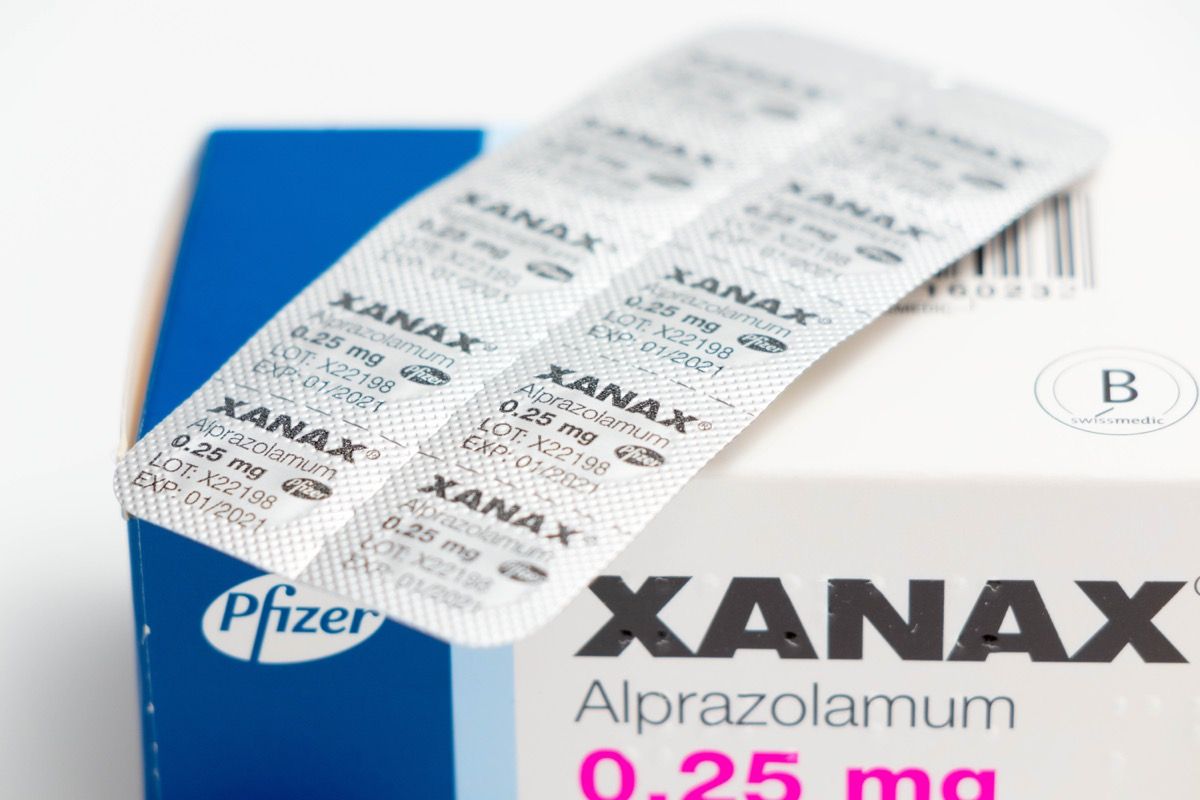These 5 Common Meds May Increase Your Risk of Dementia
Much is still unknown about dementia. Do genetics contribute to your risk? And how do lifestyle choices impact your chances of developing this condition, which affects more than 55 million people worldwide? While researchers are still studying these factors—and searching for a cure—there’s evidence that certain medications may play a role in cognitive decline, particularly in older patients.
Robert Alesiani, PharmD, chief pharmacotherapy officer at Tabula Rasa HealthCare, explains that “medications can have side effects, and those side effects bring on more medications to treat the side effects—it’s just a growing cascade of medication.” Read on to see which common medications he says may increase your risk of dementia.
READ THIS NEXT: Taking This Medication for Even a Short Time Spikes Your Dementia Risk.

A popular brand name of the drug diphenhydramine, Benadryl is an antihistamine that can be used to treat allergy and cold symptoms. (Some people also use it as a sleep aid.)
Benadryl is an anticholinergic, a class of medicine that inhibits parts of the parasympathetic nervous system, which is responsible for involuntary movement of muscles in your gastrointestinal and urinary tracts, lungs, sweat glands, and more. Anticholinergic drugs can cause unpleasant side effects such as dry mouth, blurred vision, trouble urinating, and constipation. But even worse, there is some correlation between patients who regularly take anticholinergics and those who develop dementia, according to Alesiani.
Studies show a “54 percent chance higher risk of patients who have been on chronic anticholinergic drugs developing dementia, versus other patients that develop dementia that have never been on these drugs chronically,” he says.
GoodRx Health pointed to a study which showed that people who took an anticholinergic medication daily for more than three years had a “significantly higher risk of developing dementia compared to people who did not take them at all.” However, it’s important to note that this study didn’t report on Benadryl specifically (or any other individual medications).
Thankfully, short-term use of drugs like Benadryl isn’t a known risk factor for dementia—so don’t worry about using it for a runny nose or a case of poison ivy.

A powerful benzodiazepine, Xanax is prescribed to treat insomnia, panic disorders, and anxiety. “Benzodiazepines work kind of the same way as anticholinergics,” Alesiani explains, “and the problem with benzodiazepines is, it’s well known that they can cause addiction or dependence.”
At this point in time, the research isn’t clear whether the association between long-term benzodiazepine usage and dementia is truly causative. But according to Alesiani, the possibility is certainly there; in studies, he says, patients who take chronic benzodiazepines seem to be at 30 percent higher risk of developing dementia than those who don’t.
READ THIS NEXT: Doing This at Night May Help You Ward Off Dementia, Study Says.

Another benzodiazepine to look out for is Valium, a sedative used to treat anxiety. According to Harvard Health Publishing, “A team of researchers from France and Canada linked benzodiazepine use to an increased risk of being diagnosed with Alzheimer’s disease. In the study, the greater people’s cumulative dose of benzodiazepines, the higher their risk.” The study showed that even higher risk than short-acting Xanax was the long-acting diazepam, otherwise known by the brand name Valium.

Some evidence shows that the antidepressant Prozac (brand name of fluoxetine), a selective serotonin reuptake inhibitor (or SSRI), may be a factor in the onset of dementia. According to a five-year study published in the The Journals of Gerontology: Series A, Biological Sciences and Medical Sciences, women who took SSRIs were twice as likely to develop dementia or cognitive impairment.
“When researching the connections between fluoxetine and dementia, studies have varied from five to 18 years in length,” journalist Miranda Stambler wrote on A Place for Mom. “However, the outcomes were largely the same. Patients on SSRIs showed a greater risk of developing dementia.”
As with the other drugs on this list, research is still in preliminary stages—no sure-fire scientific evidence says that SSRI use definitely causes dementia, but the connection is being looked at closely.

Proton pump inhibitors reduce acid in the stomach and are often used to treat acid reflux and heartburn. Brand names include Nexium, Prilosec, and Prevacid. “There seem to be a higher percentage of [dementia patients] that are on chronic PPIs,” Alesiani says, but admits there’s no clear answer as to why.
“In our pharmacy PPIs are something that we very we look at very closely, not just because of the long term risk of cognitive [issues] or dementia… it can inhibit a patient’s absorption and things like calcium and magnesium… it can increase the risk of osteoporosis,” he explains. “It can cause a decrease of gut flora so get the problems with different bacteria. And if patients have an aspiration, or they get those bacteria into their lungs, they can have an increased risk of pneumonia and other problems. So [when it comes to] chronic PPIs, there’s a lot of reasons why patients don’t want to be on these things for long periods of time.”
For more health news sent directly to your inbox, sign up for our daily newsletter.

Citing research showing that people with deficiencies in vitamin B12 and vitamin D experienced “memory problems and some cognitive cloudiness,” and were at higher risk for dementia, Alesiani recommended speaking with your healthcare provider to make sure you are taking in adequate levels of these two crucial vitamins.
Alesiani also emphasizes the importance of only taking medication when absolutely necessary. “It’s easier to take a pill once a day than it is to make lifestyle modifications,” he says, noting that while many drugs are “great” and “can help people get through some very tough times,” they can cause huge physical problems when used chronically over long periods of time. So it’s always best to be closely in dialogue with your healthcare provider about the drugs you’re taking.
“It’s very important the patient never make global changes to their prescription medications on their own,” Alesiani says. “Stopping certain medications abruptly may place the patient at greater risk acutely than continuing that therapy until a controlled thorough plan to discontinue therapy is considered. If considering changing or stopping a medication, always consult your pharmacist or prescriber first.”
Best Life offers the most up-to-date information from top experts, new research, and health agencies, but our content is not meant to be a substitute for professional guidance. When it comes to the medication you’re taking or any other health questions you have, always consult your healthcare provider directly.
" Conservative News Daily does not always share or support the views and opinions expressed here; they are just those of the writer."





